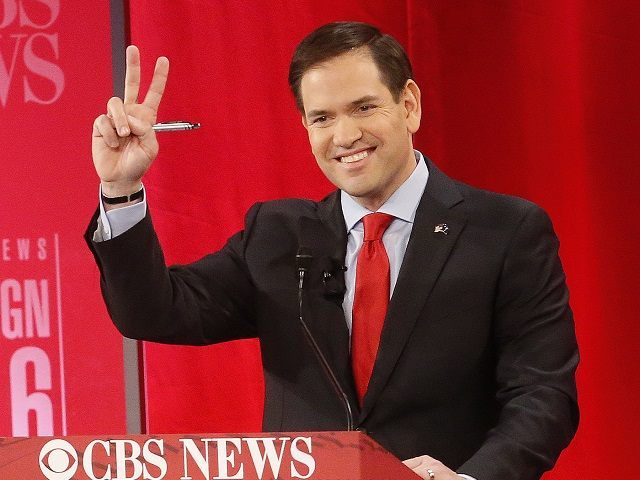Saturday Night marked the ninth consecutive debate in which Marco Rubio was not asked about his position on what could arguably be the most impactful trade agreement in modern history—Obama’s Trans-Pacific Partnership agreement.
The failure of CBS News’ moderators to ask Rubio about TPP is significant because Sen. Rubio is the only top-polling candidate who will not reveal how he’ll vote on the deal, which he previously endorsed. Indeed, earlier this year, Rubio told reporters that he will not disclose how he plans to vote on the deal until at least two months after Super Tuesday—i.e., after 44 states’ primaries are over and Republican voters can no longer make their voices heard on the matter.
It is somewhat bizarre that Rubio will not tell Americans how he plans to vote on the deal, given his former enthusiastic support for it. In an April 29 op-ed in the Wall Street Journal, Rubio wrote: “We must rebuild our own military capabilities, [and] conclude and pass TPP.” In a May 13th address to the Council on Foreign Relations, Rubio said it is “more important than ever that Congress give the president trade promotion authority so that he can finalize the Trans-Pacific Partnership and the Trans-Atlantic Trade and Investment Partnership.”
By a nearly five-to-one margin, Republican voters believe these so-called free trade deals lower wages rather than raise them, according to Pew polling data.
CBS’ failure to ask Rubio about the deal comes on the heels of a viral video showing the moment when the HVAC company Carrier told 1,400 Indianapolis workers that their jobs will be offshored to Mexico.
In stark contrast to Marco Rubio, Donald Trump has made his opposition to the Trans-Pacific Partnership a central platform of his campaign. Trump’s campaign has repeatedly made the case that “a Trump Presidency is the only guaranteed way to keep America out of this disastrous trade deal.”
By subscribing, you agree to our terms of use & privacy policy. You will receive email marketing messages from Breitbart News Network to the email you provide. You may unsubscribe at any time.
While Ted Cruz has told voters that he will not support the deal “in its current form,” Cruz voted to fast-track the Trans-Pacific Partnership in May of last year.
Cruz even co-authored a Wall Street Journal op-ed with Paul Ryan in favor of Obama’s trade agenda and was vocal in criticizing Jeff Sessions for opposing the Obama-Ryan trade agenda. Cruz dismissed Sessions’ concerns about the deal’s erosion of U.S. sovereignty–describing Sessions’ assertions as “not accurate… There is nothing in TPA or TPP that can give a foreign body the ability to make binding law in the United States of America under our Constitution,” Cruz said. Despite campaigning for granting President Obama fast-track powers and even voting to do so, Cruz later changed his vote, citing specific concerns unrelated to the general principle of fast-tracking trade deals.

COMMENTS
Please let us know if you're having issues with commenting.